The ICC’s Joint Center for Biocomputing and Digital Health will present a Monday afternoon lecture series beginning October 25, 2021, with a talk from Dr. Traci Yu (BME) who will present, “Optimization of Deep Brain Stimulation Therapy: Application of Neural Computing.” The lecture will take place in Rekhi Hall, Room 214.

On May 18, 2021, Dr. Guy Hembroff, Applied Computing, presented an invited talk at a meeting of Michigan’s Health Information Management Systems Society (HIMSS). Dr. Hembroff discussed his work developing a trusted framework architecture designed to improve population health management and patient engagement.
The talk demonstrated his team’s work in the development of accurate geo-tagged pandemic prediction algorithms, which are used to help coordinate medical supply chains to care for patients most vulnerable to COVID-19, an innovation that can be extended to help improve general population health management.
The framework of the pandemic prediction architecture, which aggregates longitudinal patient health data, including patient generated health data and social determinants of health, is a holistic and secure mHealth community model. The model can help Michigan residents overcome significant barriers in healthcare, while providing healthcare agencies with improved and coordinated population management and pandemic prediction.
The architecture’s machine learning algorithms strategically connect residents to community resources, providing customized health education aimed to increase the health literacy, empowerment and self-management of patients. The security of the architecture includes development of unique health identifiers and touch-less biometrics capable of large-scale identity management.
Dr. Guy Hembroff is an associate professor in the Applied Computing department of the Michigan Tech College of Computing, and director of the Health Informatics graduate program. His areas of expertise are network engineering, medical/health informatics, biometric development, intelligent medical devices, data analytics, and cybersecurity.
The event was sponsored by HIMSS and Blue Cross Blue Shield of Michigan (BCBSM).
A mission-driven non-profit, the Healthcare Information and Management Systems Society, Inc. (HIMSS) is a global advisor and thought leader supporting the transformation of the health ecosystem through information and technology, according to the organization’s website.
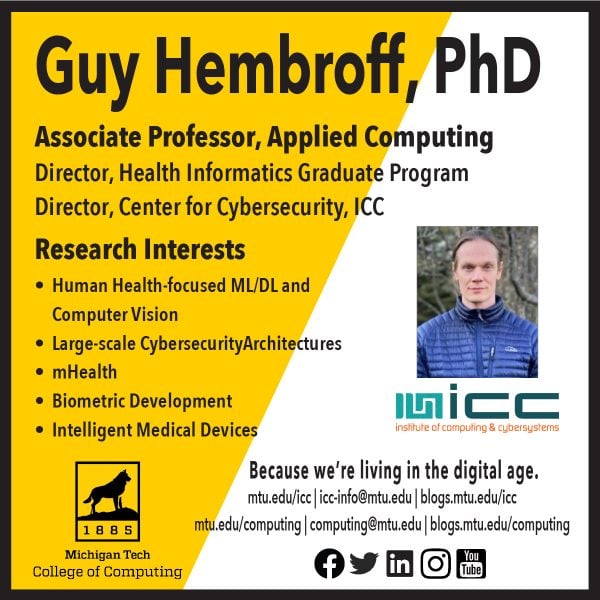
Dr. Guy Hembroff presented a talk to representatives of a number of digital health startup companies May 20, 2021, as part of an event hosted by the the HealthSpark program of 20 Fathoms, an entrepreneurial-focused member organization in Traverse City, Michigan.
The startup companies, in many U.S. locations, are being mentored by 20 Fathoms members.
Dr. Hembroff is an Associate Professor of Applied Computing and director of the Health Informatics Master of Science degree program at Michigan Tech.
Dr. Hembroff’s talk, “Cybersecurity and Privacy + X: Best Practices for Health Startups,” was designed to help startup companies gain awareness of and plan strategically for the cybersecurity and privacy elements of their company, affiliations with vendors, and the rights and protections of consumers.
Talk topics included an overview of data security and privacy, web security, scams and fraud detection and protection, mobile device security, network security, incident response, digital health data integration and interoperability, and protection from ransomware attacks.
The HealthSpark program is Traverse City’s digital health accelerator. The organization advances innovation and facilitates solutions that will resolve today’s challenges in rural healthcare. A community-focused initiative, HealthSpark work sto bring world-class healthcare solutions to rural patients through the advancement of digital technology.

20Fathoms is a membership organization for entrepreneurs, intrapreneurs, tech professionals, creatives, and other innovators in the the Traverse City, Michigan, region.
Led by a team of experts who have walked-the-walk, we provide services, resources, support, and a robust network to help our members accelerate both their careers and businesses, according to the 20Fathoms website.
Assistant professor Hoda Hatoum (BioMed) gave a talk titled “Novel Predictive Model for Leaflet Thrombosis in Transcatheter Aortic Valve Replacement” as part of the Young Investigator Awards: Basic and Translational Science competition at the virtual American College of Cardiology 70th annual Scientific Session & Expo (ACC.21).
Hatoum also presented two posters on TAVR performance and co-authored a third on pressure recovery at the ACC.21 conference, which was held May 15-17 and featured more than 200 sessions across 11 learning pathways featuring late-breaking science, practice-changing research and cutting-edge education.
Jingfeng Jiang (BioMed/HRI) is the principal investigator on a project that has a received a $346,966 research and development grant from the National Institutes of Health.
The project is titled “Personalized Management of Intracranial Aneurysms Using Computer-aided Analytics.”
Jinshan Tang (AC/HRI) is a co-PI on this potential four-year project, which could total $1,349,106.
by Mechanical Engineering-Engineering Mechanics
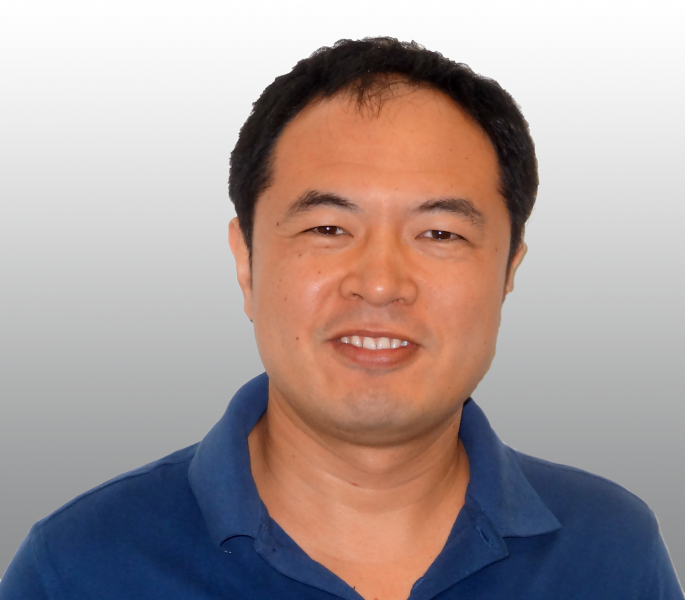
The net virtual graduate Seminar Speaker will be held at 4 p.m. tomorrow (April 8) via Zoom.
Weihua Zhou (CC) will present “Artificial intelligence for medical image analysis: our approaches. “
Zhou, is an assistant professor of applied computing at Michigan Tech. He has been doing research on medical imaging and informatics since 2008. Attend virtually.
View the University Events Calendar, which includes a registration link and additional information about Dr. Zhou and his research.
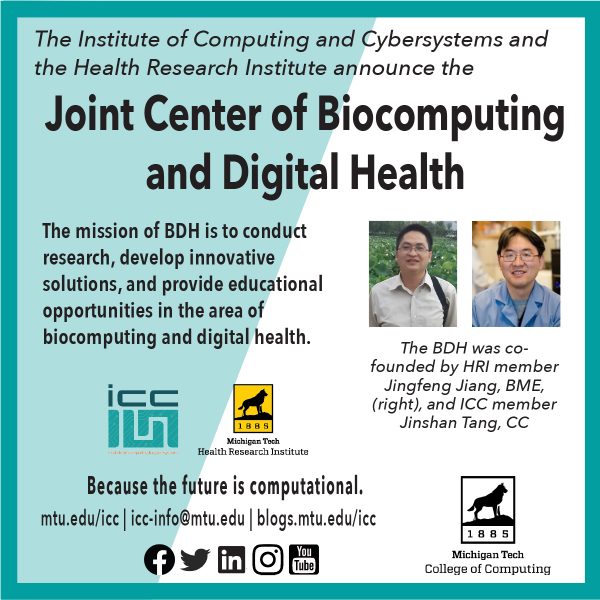
The Institute of Computing and Cybersystems (ICC) and the Health Research Institute (HRI) have established the Joint Center of Biocomputing and Digital Health (BDH).
The new research institute was co-founded by HRI member Jingfeng Jiang (BME) and ICC member Jinshan Tang (CC).
The mission of Joint Center of Biocomputing and Digital Health (BDH) is to conduct research, develop innovative solutions, and provide educational opportunities in the area of biocomputing and digital health, thereby enhancing Michigan Tech’s ability to recruit and retain high-quality researchers and students, elevating Michigan Tech’s presence in developing technologies for healthcare delivery, and increasing knowledge sharing in the global community.
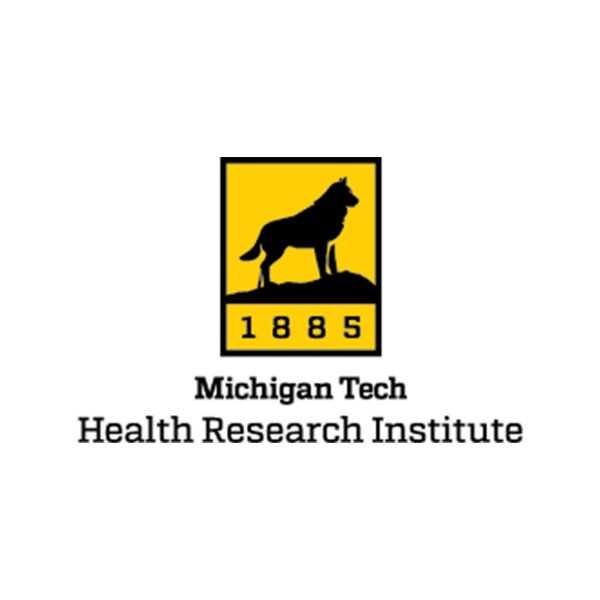
Jingfeng Jiang is a professor with the Department of Biomedical Engineering. His research interests are in biomechanics, automated control of ultrasound scanning including the use of 3D printing technology, image and signal processing, non-invasive assessment of biomechanical properties of soft tissues, and computer aided analyses of cardiovascular flow.
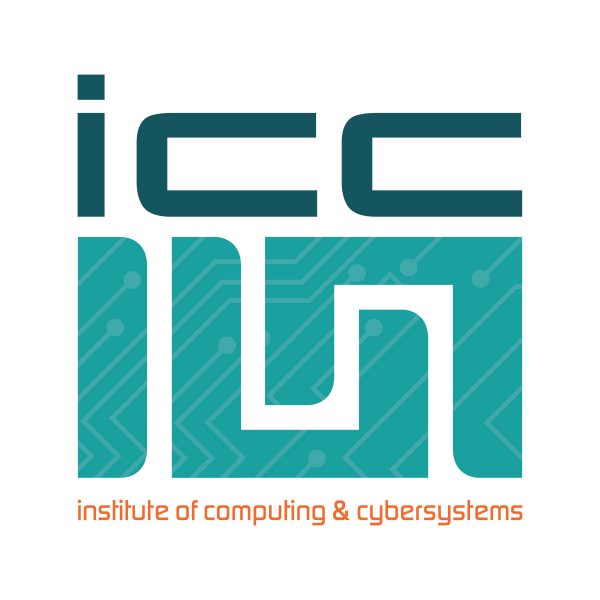
Jinshan Tang is a professor in the Department of Applied Computing. His research interests are in image processing and pattern recognition, biomedical imaging and medical image analysis, and medical informatics and intelligent medical diagnosis systems. Tang is a member of the ICC’s Center for Cyber-Physical Systems.
The Institute of Computing and Cybersystems (ICC) creates and supports an arena in which faculty and students work collaboratively across organizational boundaries in an environment that mirrors contemporary technological innovation.
The Health Research Institute (HRI) aims to establish and maintain a thriving environment that promotes translational, interdisciplinary, and increasingly convergent health-related research and inspires education and outreach activities.
Please contact Jingfeng Jiang (jjiang1@mtu.edu) with questions.
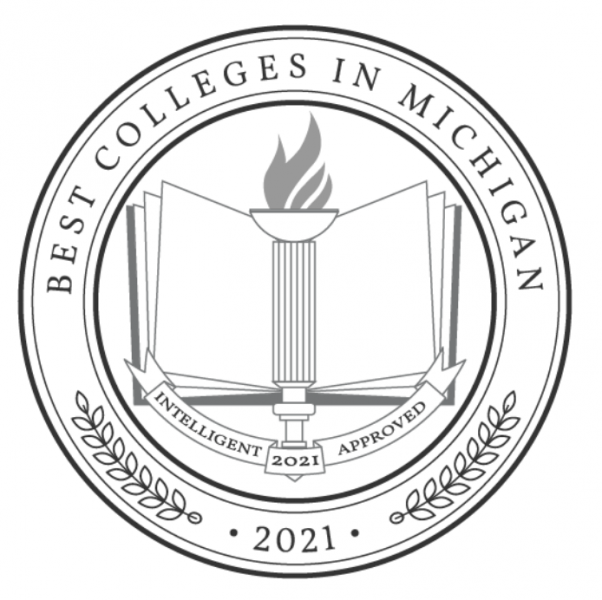
Several Michigan Tech College of Computing degree programs have been ranked among the best in the nation by Intelligent.com. In addition, the research guide ranked the University number three among all colleges in Michigan.
Intelligent.com looked at nearly 2,300 accredited colleges and universities nationwide making evaluations based on curriculum quality, graduation rate, reputation and post-graduate employment. Programs were evaluated on a scale of 0 to 100 with Michigan Tech making it to the final list for 12 separate degree programs.
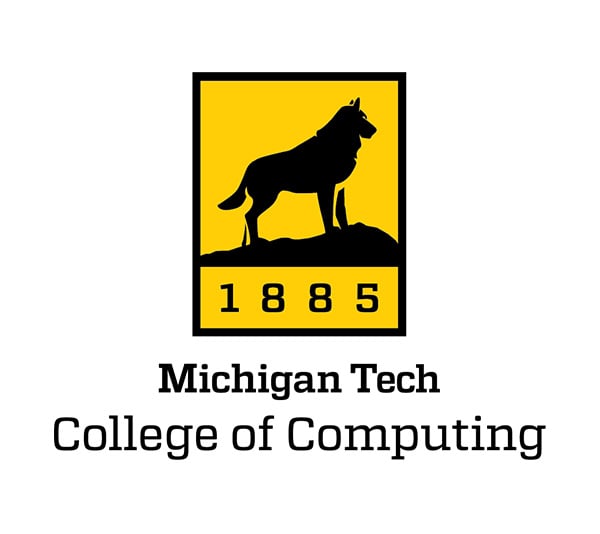
The four College of Computing programs and their national ranking as rated by Intelligent.com are:
Additional Michigan Tech degree programs included in the ranking are:
- Master’s in Civil Engineering Degree Programs — #4
- Marketing Degree Programs — #5
- Sports Management Degree Programs — #8
- Sports Medicine Degree Programs — #20
- Master’s in Mechanical Engineering Degree Programs — #22
- Master’s in Electrical Engineering Degree Programs — #25
- Master’s in Science Education Degree Programs — #26
- Master’s in K-12 Education Degree Programs — #43